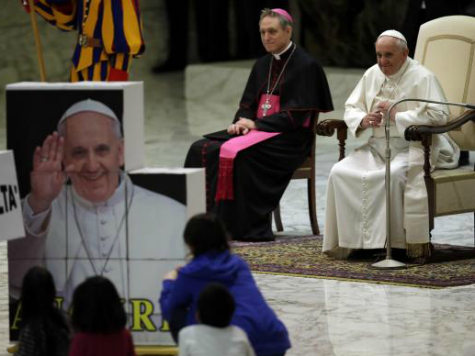
In an interview with the Italian newspaper La Stampa published Sunday, Pope Francis offered a clarification of the economic views he articulated in his November 24th apostolic exhortation, Evangelii Gaudium.
“The Marxist ideology is wrong,” he told La Stampa. The pontiff added, “I have met many Marxists in my life who are good people.”
The Pope also noted that his controversial statements contained in Evangelii Gaudium on economics were made not as a professionally trained economist, but from the perspective of church doctrine. “I wasn’t speaking from a technical point of view,” he said. “What I was trying to do was to give a picture of what is going on… I was not, I repeat, speaking from a technical point of view but according to the Church’s social doctrine. This does not mean being a Marxist.”
While rejecting Marxism, the Pope still appeared confused about the role free markets and capitalism play in alleviating poverty. Once again, questions about translations of the original statements to English added to the confusion.
Breitbart News reported earlier that the Pope’s statement in Evangelii Gaudium about “trickle-down” economics had apparently been mistranslated from the original Spanish. Spanish is the Argentian pontiff’s primary language and was the language he used to write the original version of the document.
The Spanish words “por sí mismo” used in the Pope’s original Spanish-language version had been translated as “inevitably” in the official English-language version issued by the Vatican. The proper translation of “por sí mismo” from Spanish to English is “by itself.”
The La Stampa website offers three language versions of its publication: Italian, Spanish, and English. It is unclear whether the Pope spoke to La Stampa‘s Vatican reporter Andrea Tornielli in his native Spanish or Tornielli’s native Italian when the interview was conducted December 10.
Both the Spanish- and Italian-language versions of Tornielli’s interview with the Pope use words that translate into English as “by itself,” rather than “inevitably.” The English-language version, however, contains the word “inevitably.”
This is the same error in translation found in the English-language translation of Evangelii Gaudium published by the Vatican on November 24.
In the English-language version or Tornielli’s interview, he quotes the Pope as saying, “The only specific quote I used was the one regarding the ‘trickle-down theories’ which assume that economic growth, encouraged by a free market, will inevitably succeed in bringing about greater justice and social inclusiveness in the world.” [Emphasis added]
In the version published in Spanish at the La Stampa website on Sunday, the Pope uses the Spanish phrase “por sí mismo” rather than “inevitablemente,” the Spanish word for “inevitably.” In this Spanish-language version, Tornielli quotes the Pope as saying “La única cita específica fue sobre las teorías del “derrame”, que suponen que todo crecimiento económico, favorecido por la libertad de mercado, logra provocar por sí mismo mayor equidad e inclusión social en el mundo.” [Emphasis added]
In the version published in Italian, Tornielli quotes the Pope using the Italian phrase “riesce a produrre di per se” rather than any of the three Italian words or phrases (“inevitabilmente,” “necessariamente,” “per forza di cose”) that translate the English word “inevitably.” The Italian version reads, “L’unica citazione specifica è stata per le teorie della “ricaduta favorevole”, secondo le quali ogni crescita economica, favorita dal libero mercato, riesce a produrre di per sé una maggiore equità e inclusione sociale nel mondo.” [Emphasis added]
The Italian phrase “riesce a produrre di per sé una maggiore equità e inclusione sociale nel mondo” translates roughly into the English “able to produce by itself a greater equity and social inclusion in the world.”
In the La Stampa interview as published in all three languages, the Pope then displayed a lack of familiarity with the empirical evidence demonstrating the positive impact of capitalism on the alleviation of poverty. “The promise was that when the glass was full, it would overflow, benefiting the poor. But what happens instead,” he said, “is that when the glass is full, it magically gets bigger; nothing ever comes out for the poor.”
Several economists and proponents of the free market, including Samuel Gregg, research director at the Acton Institute and author of Tea Party Catholic, have taken exception to the Pope’s understanding of the role of capitalism in alleviating poverty. Writing in the National Review recently, Gregg said there were “several problems with this line of reasoning.”
“First,” according to Gregg, “opening up markets throughout the world has helped to reduce poverty in many developing nations. East Asia is a living testimony to that reality — a testimony routinely ignored by many Catholics in Western Europe (who tend to complain rather self-centeredly about the competition it creates for protected Western European businesses and other recipients of corporate welfare), and a reality about which I have found many Latin American Catholics simply have nothing to say.”
“Second,” Gregg added, “it has never been the argument of most of those who favor markets that economic freedom and free exchange are somehow sufficient to reduce poverty. These things are certainly indispensable (witness the failure of planned economies to solve the problem of scarcity), but they’re not enough. Among other things, stable governments that provide infrastructure, property arrangements that identify clearly who owns what, and, above all, the rule of law are just as essential.”
Earlier this month, citing a source familiar with discussions in the Vatican, Breitbart News reported that Pope Francis was likely to offer a clarification of his views on economics in an interview rather than through another formal papal document. The La Stampa interview published on Sunday may be just the first of several such clarifications.

COMMENTS
Please let us know if you're having issues with commenting.